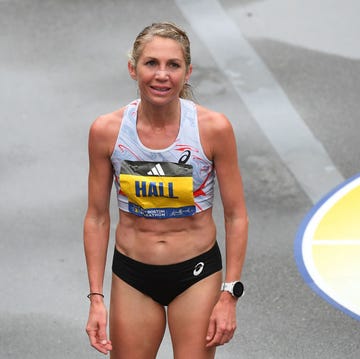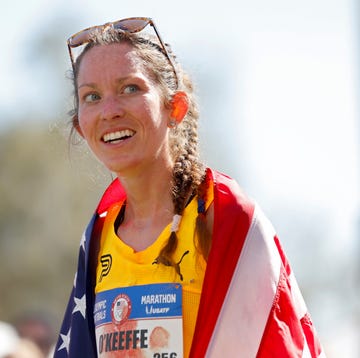Since turning 50 just two months ago, Sean Wade has raced the fastest times ever for the 50-plus age group at five track distances. Now the Houston-based athlete is resuming his aggressive speed work in an attempt to take every 50–54 world outdoor record—from 800 to 10,000 meters.
Wade joined the age group on February 3 and already has the outdoor 5,000- and 10,000-meter records, with a 14:52.92 and 30:48.87, respectively. His eight-week tear began with indoor 1500-meter, mile, and 3,000-meter marks at three meets at Boston University during his birthday month. Then he went on to nail the outdoor 5,000-meter mark in March, in Houston, and the 10,000 meters on April 1, in San Francisco.
Pro Runners Ask: Is My Agent Worth the Fee.
“I just followed the young kids,” he said.
That strategy is nothing new for Wade, who has a 22-year-old training partner. He was ready for some good winter racing after a workout in January in which he ran 16 x 200 meters in 31 to 32 seconds with 30 seconds recovery between sprints. He wasn’t finished. After jogging a mile, Wade ripped off a 2:42 for 1,000 meters.
“My mentality is to kill my track workouts,” said Wade, who runs about 60 miles per week.
That level of speed makes his goals for this spring and summer realistic—1:58 for 800 meters, 3:58 for 1500 meters, and a sub-4:20 mile.
But first he will attempt a sub-15:00 5K on the roads, which has also never been done by a runner 50 years or older. (Wade ran a 14:59 three months before his birthday.) His other big event is the 1500-meter masters exhibition race at the U.S. Olympic Track & Field Trials on July 2, in Eugene, Oregon.
Wade ran the 1996 Olympic marathon in Atlanta, competing for his native New Zealand. But over the years he dropped down to middle distances because the shorter and faster he runs, the healthier he feels. But even with his successful speed-driven program, Wade takes every measure possible to ensure that he’s in one piece by including pool workouts and never running longer than an hour. Wade also has regular massages and chiropractic work twice a week.
“I spend more time getting treatments than I do running,” he said.
Without those treatments, Wade said, he would have not have been able to sustain his record attempts. In all, Wade ran eight races in eight weeks. In his first record, a 4:23.07 mile, Wade doubled back later in the meet in the 3,000 meters just for a workout. The next week in Boston, he set the second of his five world marks, running the 3,000 meters in 8:43.63. In his final Boston race, another mile, Wade, seeking 4:20, came up short in 4:26.53. He still collected a world 1500-meter record with his split of 4:07.01.
In Wade’s first Boston mile, more than three seconds faster than the first, his 1500-meter split was also a lot faster, probably around 4:04. But for that race Wade forgot to make sure the official timer was set up to take his 1500-meter split.
“You can’t just show up and run,” said Wade, who makes his living as coach of a training group called The Kenyan Way. “I have to do a lot of organization to make sure a record is verified as official.”
Even in his record-setting performances Wade usually places far back in the young field, so he contacts meet timing companies beforehand to make sure the photo timers will register him when he crosses the line.
While Wade looks as young as many of his competitors, he feels that his 50-year-old body is always ready to betray him. He wears flats instead of spikes when he races. He limits his interval work to no more than three miles total. The day after every race he runs in a pool instead of on land. After his 10,000-meter record, his calves were so sore, he said, that he jogged the next week while doing two pool workouts a day.
Wade’s 5,000- and 10,000-meter records were the toughest for him. Prior to the 14:52, Wade had made an earlier 5,000-meter attempt in California. His pace was so fast that he was almost dropped out of the race, struggling home in 15:06. In his 10,000-meter record—probably Wade’s toughest, given his lack of long runs—he set his watch to beep every few seconds to make sure he was on 74-second 400-meter pace for all 25 laps.
In his 5,000-meter performance, Wade shaved the previous record by about a quarter-of-a-second. Wade, 5 feet 10, and 144 pounds, might have missed that mark if he was carrying another pound or two. He will not allow that. Every morning for breakfast, to help keep his weight down, he has a fruit smoothie containing 40 grams of protein. After workouts, he downs 60 ounces of a carbohydrate drink.
With typical Kiwi understatement, Wade is not all that impressed with himself, even though he’s now being called “the Henry Rono” of 50-year-olds by Ken Stone, masters statistician. Rono, the great Kenyan, raced to four world records in 80 days in 1978. Wade collected five records in 56 days. “But I’m still only beating 50-year age records,” Wade said.
Maybe so, but on age-graded tables, Wade’s 4:23.07 indoor mile is worth a 3:50 for open runners. That’s a comparison for Wade to enjoy while soaking in his next ice bath.
Sean Wade’s Five World Records in 56 Days
| Date | Meet | Event | Time | Previous Record |
| 2/6/16 | Advertisement - Continue Reading Below | Mile | 4:23.07 | 4:26.75, 2002 |
| 2/13/16 | Valentine Invite | 3,000m | 8:43.63 | 8:49.37, 2004 |
| 2/28/16 | Last Chance | 1500m | 4:07.01* | 4:09.98, 2006 |
| 3/25/16 | Lopez Classic | 5,000m | 14:52.92 | 14:53.2, 2003 |
| 4/1/16 | Distance Classic | 10,000m | 30:48.87 | 30:55.16, 2010 |
*1500-Nutrition - Weight Loss
Chappell Roan: I Love Running. But Not Anymore.

Marc Bloom’s high school cross-country rankings have played an influential role in the sport for more than 20 years and led to the creation of many major events, including Nike Cross Nationals and the Great American Cross Country Festival. He published his cross-country journal, Harrier, for more than two decades.













